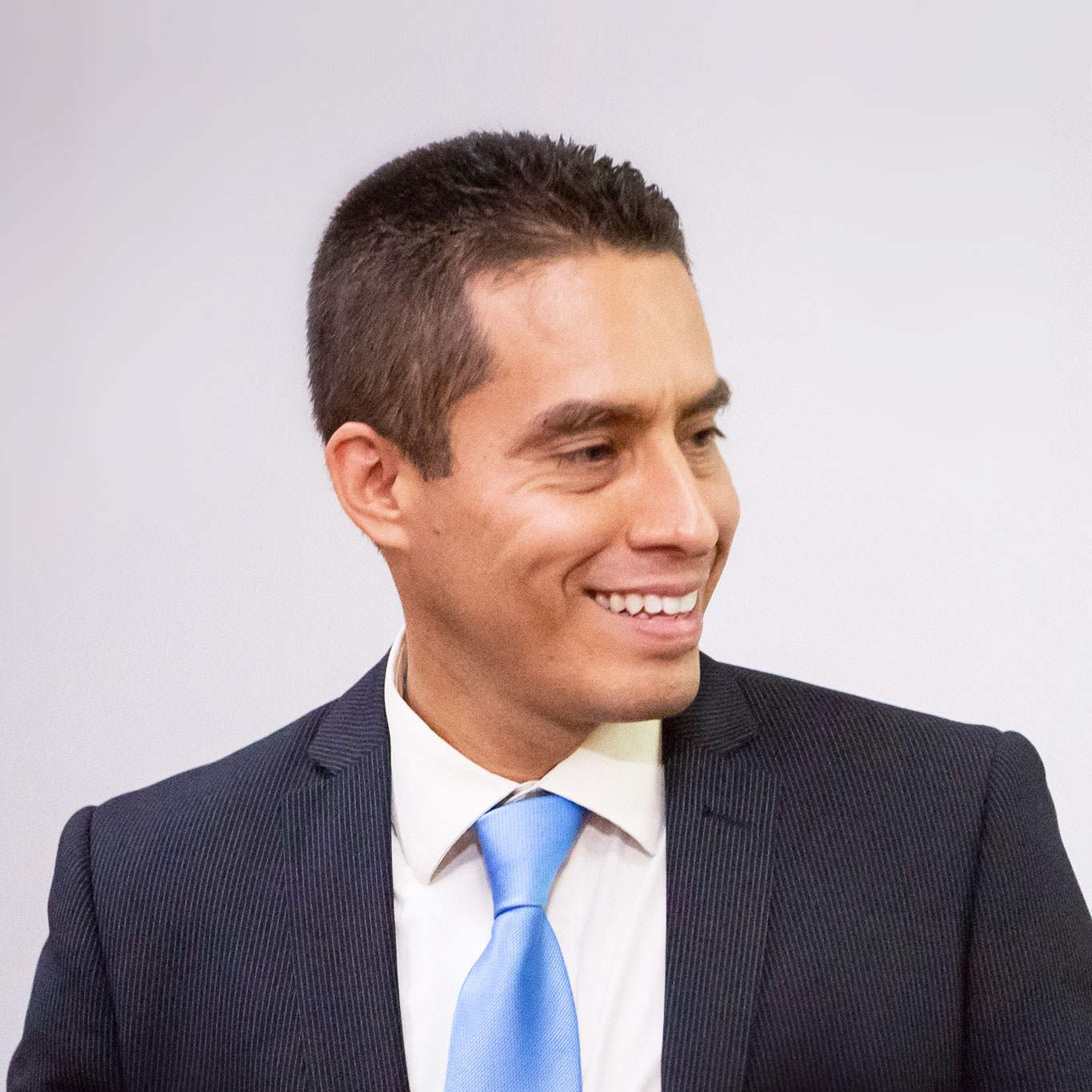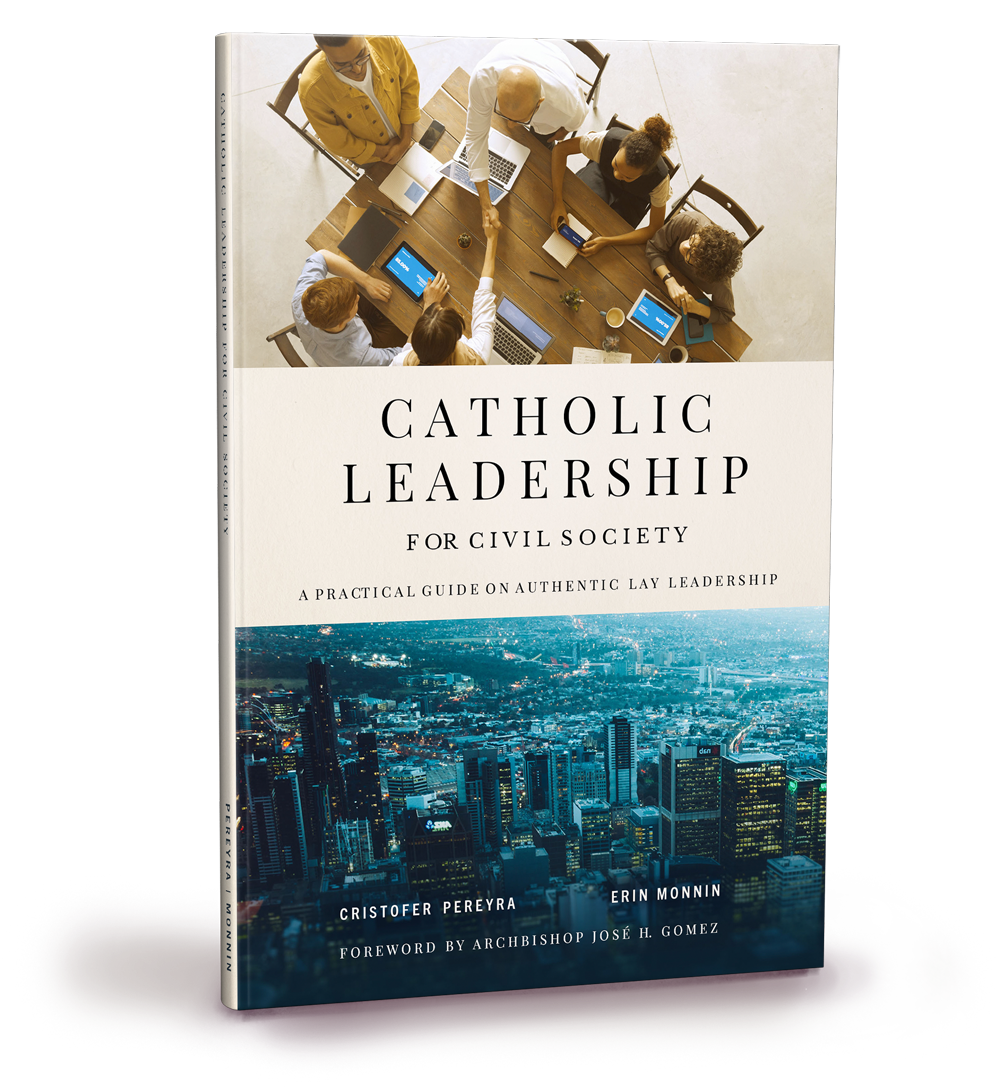About the Book
With their new book, Catholic Leadership for Civil Society, authors Cristofer Pereyra and Erin Monnin provide a guide to authentic lay Catholic leadership. The book challenges the laity to take on leadership roles in the secular world.
Catholic Leadership is structured to show that lay Catholic leadership is not meant to be lived out within the confines of the Catholic faith-community exclusively, but instead serve mainly as a guiding force which illuminates every aspect of secular society with the Truth of the Gospel. The book explains why lay Catholic professionals have a unique responsibility and privileged opportunity to influence the world for Christ. It’s not an optional prerogative, but their duty as baptized children of God. The authors explain that chance and coincidence are not compatible with the Catholic faith. If God has blessed some lay Catholics with a professional career, then their career must obligatorily become those Catholics’ field of mission. Ultimately, this book explores specific fields and concrete ways to carry out Catholic leadership for civil society.

Meet Cristofer Pereyra
Cristofer Pereyra is the Chief Executive Officer for Tepeyac Leadership, Inc., a global non-profit organization dedicated to civic leadership development for lay Catholic professionals. Through its signature program TLI, the organization provides a catalyst development experience which equips professionals to become virtuous leaders, influencing the culture and serving the common good. Pereyra’s professional career started in media, when he worked for Univision Communications as a television news reporter. He is happily married, and the father of four.
Meet Erin Monnin
Erin Monnin is a Catholic wife, mother, entrepreneur, speaker, writer, and social media influencer. As a dedicated Catholic leader and professional, her faith permeates every aspect of her life, and she sees the times we live in as a great opportunity to evangelize through our words and actions. Erin is a former FOCUS (Fellowship of Catholic University Students) missionary, a Tepeyac Leadership Initiative graduate, a Bible study leader, co-host of the “Catholic Leadership for Civil Society” podcast and blogger on multiple Catholic leadership topics.

Foreword by
Most Reverend José H. Gomez,
Archbishop of Los Angeles
March 19, 2022
The Church exists to evangelize. There is no other reason, no other purpose for the Church. And the Church is all of us.
For too long now people have thought the Church’s mission is only a responsibility for bishops, priests and religious, or for “Church professionals” working in parishes and chanceries.
But Jesus never said that. His words are clear: “Go, therefore, and make disciples of all nations, baptizing them in the name of the Father, and of the Son, and of the Holy Spirit, teaching them to observe all that I have commanded you.” And he addresses these words to every one of us with no exceptions; no matter what our state in life or our “rank” in the Church.
When the great pope St. John Paul II came to America in 1987, he said: “The work of evangelization is not over. On earth it will never be over. … The duty of carrying forward this work rests on the whole Church and on every member of the Church.” Again, that means every baptized Catholic. Every one of us in the Church is called to evangelize, to be a missionary disciple, as our Holy Father Pope Francis likes to say.
In this moment in the Church’s history, we are living in the “hour of the laity.” Now more than ever, it is time for the lay men and lay women of the Church to burn with new desire to love Jesus and to bring his holiness and salvation to every person.
At the dawn of the first evangelization, when Our Lady of Guadalupe appeared at Tepeyac as the bright star lighting the path to Jesus for all the Americas, she did not show herself to the bishop or the priests or even to the missionaries at the time. Instead, she entrusted herself to a lay person, St. Juan Diego.
She gave him a mission: go and tell the bishop to build a church where all peoples could come to the encounter with the living God in Jesus Christ, and where they could know his love, his compassion, and his salvation.
Our Lady continues to call the laity with tender affection, speaking to your heart as your Mother, just as she spoke to Juan Diego. Our Lady is calling you to build the Church in America, to bring our neighbors to Jesus.
America is highly secularized now, and the sense of the sacred and transcendent is being lost. We are living in a time of dangerous confusion about the true meaning of human life and human freedom.
But we know that his world will not be saved by politics or technology or by all our efforts to define our own concepts of existence. Only Jesus. No other name under heaven can save us. He is the way that leads to the truth about our lives, to the love and happiness that we all long for.
We need to bring our neighbors to a new personal encounter with Jesus Christ. This was St. John Paul II’s vision for the Church in America. This was the task Our Lady of Guadalupe entrusted to St. Juan Diego.
This is our vocation now. We bring others to Jesus, not only through the words that we speak, but even more, we share Jesus by the way we live. By our attitudes and actions, by the way we treat people, by the choices we make in the humble, ordinary things we do every day. At work, at home, in our friendships.
Imagine if every Catholic in America would bring just one person to an encounter with Christ. And what if each of these people would then bring one more person to Jesus? We could change America! We could change the world for Jesus!
This is how we carry out the Church’s mission. Not with complicated programs or pastoral plans. But person to person, heart speaking to heart about the love of Jesus, about who he is and what he has done for us by shedding his blood on the Cross.
In this fine book, Cristofer Pereyra and Erin Monnin offer an inspiring, hopeful, and practical vision for the new evangelization of our country.
As the founder of Tepeyac Leadership Initiative, Pereyra has a deep concern for the formation of Catholic leaders who can bring the Church’s principles and values to bear on their work in public life and in their professions.
I pray that this book will find a wide audience and touch many hearts.
May Our Lady of Guadalupe be near to each one of you who reads this, and may she help us all to be apostles and missionary disciples, lead many people to know the joy and newness of life that we have in Jesus Christ! ◾️
Reviews
“This book will challenge you to lead in the Catholic church. Are you taking ownership of your Catholic faith to live it out and lead others by example? The book provides some inspiring examples and clarifies key principles of the Catholic faith to guide Catholic leadership. Practical advice and resources are also included. In addition, you will find a prayer to ask for guidance in your own personal journey, as you open yourself up to the possibilities where the Holy Spirit will help you find a need in the world for you to witness the joy and truths of the Catholic faith, for the good of the world. Read this book for an introduction to what Catholic leadership is, and start developing your own role as a Catholic leader.” – Noelle P.
“Catholic Leadership for Civil Society is a refreshing antidote for a broken world. The book is realistic in delineating the dismal situation that faces nearly every industry, yet its frankness is countered by hope in Christ, who has not abandoned us, but wishes to raise up leaders to renew the earth. One can’t help but be inspired by the presentation of practical tips for professionals, the stories of modern lay leaders, and the call to service and faithfulness. All the church should be reading this treasure – we are being called to lead and here we are given the foundation and tools we need to start.” – Mari P.
“This excellent book is an easy read but is packed with great leadership insight for all Catholics who want to be authentic in the workplace! As the authors emphasize, it is really up to the laity to transform the world and not just the hierarchy of the Church. I highly recommend it to anyone who is starting out in their career or those that are looking to become the best professional in their field of work.” – Thomas T.
“Catholic Leadership for Civil Society is a book for all Catholics. We are called to live out our faith and the gospel in our daily lives whether a working professional, stay at home mom, or retired. This book succinctly lays out the path for us to get involved in our society, living out our faith as we are all called to be saints. As the book states, reclaim the world for Him!” – Andrew W.
“For several years, prior to this book, I was in search of a work that encompassed the essence of being authentically Catholic and living out my faith in the professional modern secular world. At some point, I came to the conclusion that in order to be Catholic in the secular world, I needed to be all in with my faith. Catholic Leadership for Civil Society illustrates all the things I was sensing and understanding as I advanced in my professional life and organizes the challenges we face in the modern world. The book takes the reader along a guided tour of the areas lay Catholics must engage in to bring back Christendom in this Apostolic age. It’s not the Holy Bible, but it is a work that takes the teachings of our faith and applies them practically to how we take action. Lay Catholic professionals can no longer sit on the sidelines while the world falls apart. A great read for aspiring leaders who want to begin forming themselves for the Apostolic age.”
– Chris G.
“This is a needed book for all Catholic professionals. It is a good read that flows very well and keeps you engaged. Both of these authors are the real deal — they live their faith and are committed to forming good leaders in virtue and the teachings of the Catholic Church. I think what I liked best of this book is the foundation they lay in leadership. You can’t go wrong with this book — a must for every Catholic professional’s library.” – Cande D.
“This book reminds everyone that claiming to follow Christ means there is a “call to action”. Faith is more than easily quoted words and a Sunday stop by the church for fellowship. Being a Christian means doing the work. This wonderful book is concise, very well written and (thankfully) an easy read. I have bought several copies to share with family and friends. Feel free to do the same.” – Kate W.
“Very timely and helpful resource for identifying formational needs. The book is a quick and easy read for anyone looking to balance their professional life and their spiritual journey. Highly recommend regardless of your faith.” – Isaac C.
“This excellent and easy to read book draws on Catholic Social Teaching and inspiration from the Saints and other writers to provide some form principles for Catholic Leadership and the practical application of them on a daily basis. I was particularly taken with the practical suggestions towards the end. I recommend this highly.” – Andrew T.
In the forward to this book, Archbishop Jose Gomez reminds the reader that when Our Lady of Guadalupe appeared in Tepeyac Hill, “she did not show herself to the bishop or the priests or even to the missionaries at the time. Instead, she entrusted herself to a lay person, St. Juan Diego.”
The authors of Catholic Leadership for a Civil Society take Archbishop Gomez’s reminder and write a survey-like manual that aims to apply the Gospel in the life of a society that is not only post-Christian but increasingly post-Liberal.
The book is composed of fifteen (15) small chapters. My review will cover the book in three sections. Chapters 1-5 constitute a rudimentary overview of the state of the laity. The second section, chapters 6-8, constitutes a treatment of fundamental principles that govern our behavior in interacting with society. The final section is a modest proposal for engaging and influencing a constellation of institutions that the authors believe are essential in rebuilding a Christendom.
The first section captures the state of Catholic life in America and captures some of the symptoms of societal decline. The authors are well versed in both scriptural and conciliar admonitions that the members of the laity have a duty and a mission in this world, and it is their role to bring the Gospel of Jesus Christ to all corners of the world. Christofer and Erin guide the reader through positive statements that call upon the laity to exercise their God-given talents towards the building of the Kingdon of God. Perhaps the most important advice that is given to the laity is the reminder that the only way out of a difficult situation is not around, but through. This requires that the Christian remember the meaning of the servant-leader, and this remains a recurrent theme throughout that book.
The second part of the book leads the reader to consider fundamental principles that ought to be basic formation for Christian leaders in a post-Christian world. It covers, in succeeding chapters, Character, Human Dignity, and Catholic Social Teaching. The chapter on character, for example, borrows heavily from Alexandre Havard’s Virtuous Leadership, explaining that maturity into leadership first begins by doing the arduous work of cultivating the classical virtues and putting oneself at the service of others through magnanimity and humility. The authors explain the value to the interior as well as the exterior life of prayer, conscientious evaluation of one’s day, and mortification.
The remaining chapters chart a way forward and highlight a broad set of institutional areas that warrant efforts at institutional changes. In addition, they provide some exemplars that live their mission to bring Christ into the world.
Overall, it’s an enjoyable book that provides ample resources to seek more, and ultimately carry your cross as a mission to move your faith from a solely private matter to one that sanctifies public life.
-Paul A.

